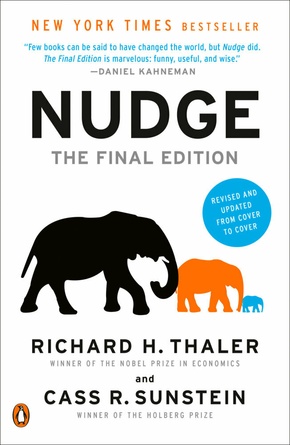| Verlag | Penguin Random House |
| Auflage | 2021 |
| Seiten | 384 |
| Format | 14,0 x 21,4 x 2,0 cm |
| Gewicht | 310 g |
| Artikeltyp | Englisches Buch |
| EAN | 9780143137009 |
| Bestell-Nr | 14313700EA |
_Once again a New York Times bestseller! First the original edition, and now the new Final Edition_
An essential new edition revised and updated from cover to cover of one of the most important books of the last two decades, by Nobel Prize winner Richard H. Thaler and Cass R. Sunstein
More than 2 million copies sold
Since the original publication of Nudge more than a decade ago, the title has entered the vocabulary of businesspeople, policy makers, engaged citizens, and consumers everywhere. The book has given rise to more than 400 nudge units in governments around the world and countless groups of behavioral scientists in every part of the economy. It has taught us how to use thoughtful choice architecture a concept the authors invented to help us make better decisions for ourselves, our families, and our society.
Now, the authors have rewritten the book from cover to cover, making use of their experiences in and out of government over the past do zen years as well as an explosion of new research in numerous academic disciplines. To commit themselves to never undertaking this daunting task again, they are calling this the final edition. It offers a wealth of new insights, for both its avowed fans and newcomers to the field, about a wide variety of issues that we face in our daily lives COVID-19, health, personal finance, retirement savings, credit card debt, home mortgages, medical care, organ donation, climate change, and sludge (paperwork and other nuisances we don t want, and that keep us from getting what we do want) all while honoring one of the cardinal rules of nudging: make it fun!
Leseprobe:
Common "Nudges"The design of menus gets you to eat (and spend) more. For example, lining up all prices on either side of the menu leads many consumers to simply pick the cheapest item. On the other hand, discretely listing prices at the end of food descriptions lets people read about the appetizing options first ; and then see prices."Flies" in urinals improve, well, aim. When Amsterdam's Schiphol Airport was faced with the not uncommon issue of dirty urinals, they chose a unique solution: by painting "flies" in the (center of) commodes, men obligingly aimed at the insects, reducing spillage by 80 percent.Credit card minimum payments affect repayment schedules. Among those who only partially pay off credit card balances each month, the repayment level is correlated with the card's minimum payment in other words, the lower the minimum payment, the longer it takes a consumer to pay off the card balance.Automatic savings programs increase savings rate. All over the country, compan ies are adopting the Save More Tomorrow program: firms offer employees who are not saving very much the option of joining a program in which their saving rates are automatically increased whenever they get a raise. This plan has more than tripled saving rates in some firms, and is now offered by thousands of employers."Defaults" can improve rates of organ donation. In the United States, about one third of citizens have signed organ donor cards. Compare this to Austria, where 99 percent of people are potential organ donors. One obvious difference? Americans must explicitly consent to become organ donors (by signing forms, for example) while Austrians must opt out if they do not want to be organ donors.

